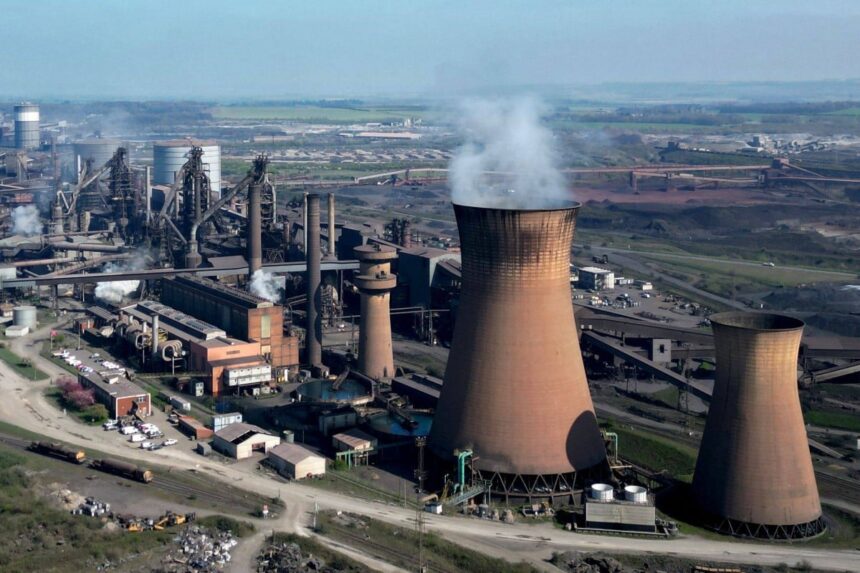Prime Minister Keir Starmer called lawmakers to Parliament for a rare Saturday session, the sixth since World War II, to push forward a bill designed to prevent British Steel’s Chinese owners, Jingye Group, from shutting down the two large blast furnaces at its Scunthorpe plant in northern England. These furnaces are essential to the steel production process.
The legislation grants Business Secretary Jonathan Reynolds authority to oversee the company’s board and workforce, secure wages for its 3,000 employees, and arrange for the delivery of raw materials needed to keep the plant operational.
Jingye has reported daily losses of £700,000 (US$910,000) at the Scunthorpe site, citing tough market conditions and rising environmental costs. The situation worsened after former US President Donald Trump imposed a 25% tariff on imported steel.
Once the bill was approved, Starmer visited Scunthorpe to reassure workers. Many expressed relief that the town’s 150-year steel making legacy was being safeguarded. This sentiment carried over to the halftime break of a Scunthorpe United football match, where fans at the Attis Arena cheered steelworkers who took to the field. Fittingly, the team is nicknamed “The Iron,” a nod to the town’s steel making roots.
Raw Steel Production
Pressure had been mounting on Starmer to act after Jingye Group halted orders for iron pellets, a key raw material for the furnaces. Without these pellets and other essentials like coking coal, the furnaces could face permanent shutdown within days, as restarting cooled furnaces is highly complex and costly.
Such a closure would leave the UK as the only G7 nation unable to produce steel from raw materials, relying solely on recycled steel through electric arc furnaces. This would have major implications for industries like construction, defense, and rail, while increasing dependence on foreign steel sources.
“We cannot and will not let the UK’s blast steel furnaces lose their heat without any plan or respect for the consequences. That’s why today’s session was crucial,” Reynolds told lawmakers. He criticized Jingye for making “unreasonable” demands during recent negotiations and said their actions might have led to the irreversible closure of British Steel’s primary steelmaking operations without government intervention.
While the bill stops short of nationalizing the plant, Reynolds acknowledged that state ownership could be an option in the future. It remains unclear how involved Jingye will be in the steel plant’s daily operations moving forward. However, failure to comply with the new laws could result in legal consequences for the company and its executives.
UK and US Trade Agreement
Meanwhile, the UK and US are reportedly close to finalizing a trade agreement amid ongoing tariff disputes between the Trump administration and China, which have disrupted global markets. Officials in Washington and London are expected to hold further discussions in the coming days, according to Downing Street sources. Beijing recently retaliated against US tariffs with duties reaching 125%, a response to Trump’s earlier moves.
Chancellor Rachel Reeves emphasized Britain’s commitment to securing a deal with the US. “We’re continuing discussions with our American counterparts to achieve the best deal possible for British jobs and industries,” she told reporters.
Despite challenges, government insiders remain “cautiously optimistic” about reaching an agreement with Washington.
Originally, the UK’s proposed 10% tariff on US goods was seen as relatively lenient compared to the 20% rate applied to many EU countries. Under a revised policy, most exporters to the US now face a 10% tariff following a temporary 90-day pause on reciprocal measures.
China remains an outlier, facing steep duties from the US, with Beijing responding in kind. These developments continue to shape the broader global trade landscape.
The trade deficit remains a core issue, with the U.S. importing $438.9 billion from China in 2024 compared to $143.5 billion in exports, resulting in a $295.4 billion deficit. This imbalance drives U.S. policy, with President Trump pushing for economic self-sufficiency and accusing China of unfair practices like subsidies and intellectual property theft.
China, meanwhile, views U.S. actions as economic bullying, asserting its economy is resilient enough to withstand pressures, partly due to diversified trade with other nations.
Related News:
U.S. Steel Hits 52-Week High as Trump Requests Nippon Steel Bid Security Review.

Geoff Thomas is an award winning journalist known for his sharp insights and no-nonsense reporting style. Over the years he has worked for Reuters and the Canadian Press covering everything from political scandals to human interest stories. He brings a clear and direct approach to his work.














